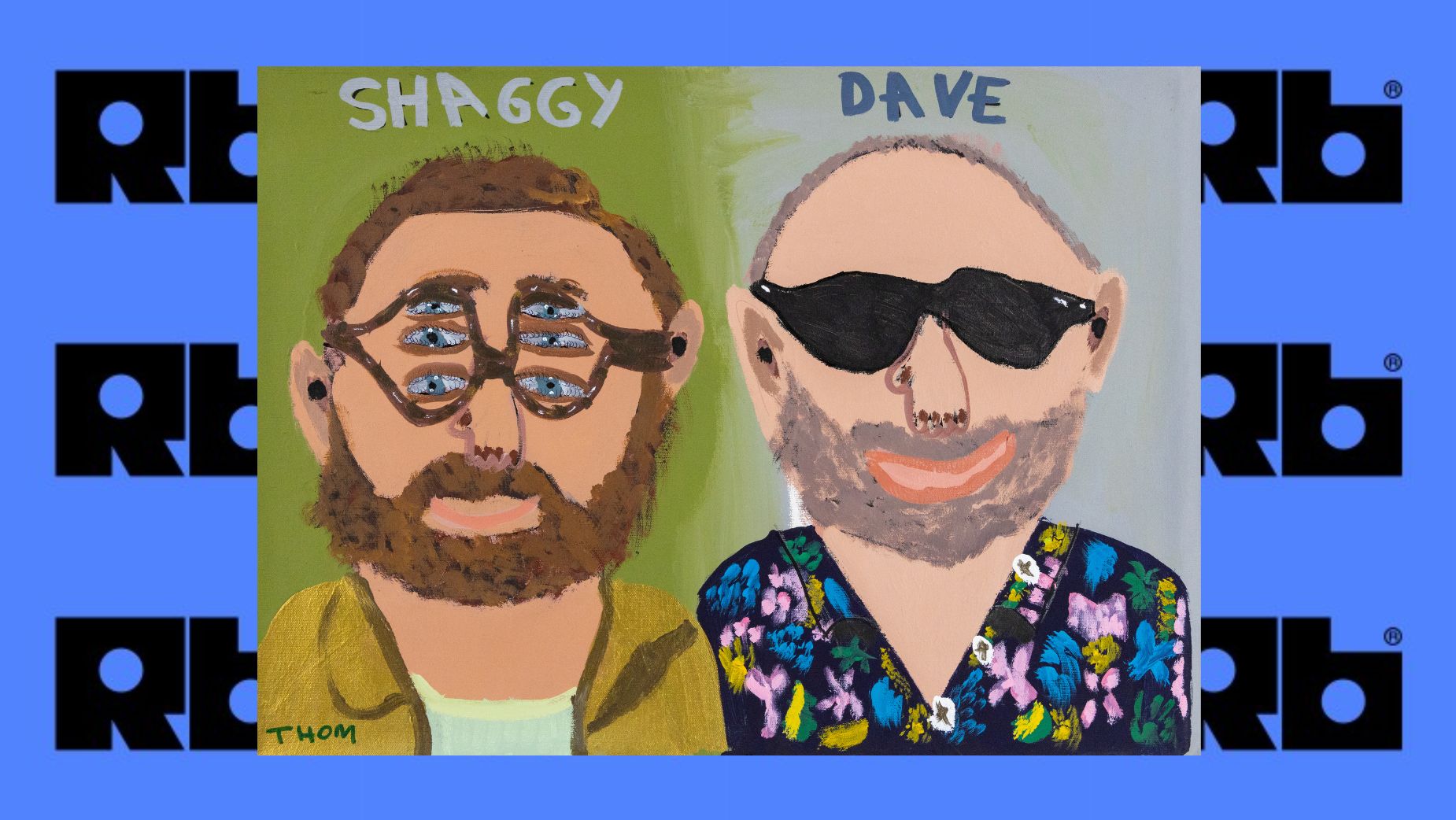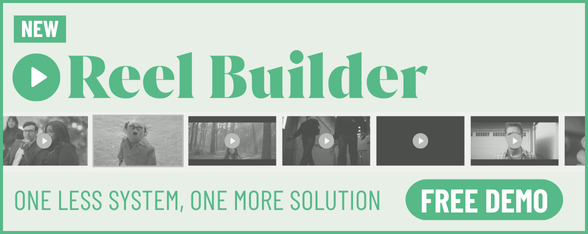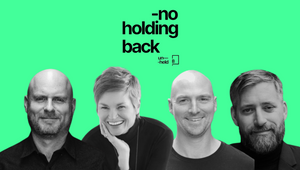
Rick Barry's Founders Spent Year One Quietly, Messily Making. Now, They’re Ready to Talk

Rick Barry has been open for a year. Rick Barry has been quiet for a year. Founders Alex Derwin and Hugh Munro say that’s because they wanted to ‘write the first draft’ privately: dodging the pressure of being defined by their first work, and figuring out what they want the agency to be before attempting to articulate it.
They deliberately started without a foundation client to build something around their own desires, not a brand’s. Rick Barry is a “creative project”, subject to constant “fine-tuning” and “tweaking”, and 12 months in, they don’t have all the answers. They’re okay with that, because “the joy is in the creation.”
“I don't think we want to rush too quickly to define [it],” Hugh tells LBB in the pair’s first interview since launching.
“We want to give ourselves plenty of time to explore new ways of doing things so we can experiment a lot. It's going to be a little while before we really try and pin anything down, if ever.”
As heritage agency brands consolidate and die, marketers over-rely on data to justify how they spend increasingly shrinking budgets, and AI pumps out content, erodes trust, and threatens traditional production models, there’s humanity in uncertainty, in imperfection. Agencies are fallible, but “that’s not how they sell themselves,” Alex says.
“There's something nice about saying, 'We're a work in progress.’ We want to be a work in progress, because that signifies: we're always chasing hard, and we're always looking to learn.
“So many agencies jump on a bandwagon, then the bandwagon falls off the road, and [there is a] new bandwagon.
“It's just a chase for relevancy. But good brand thinking is always going to be relevant. Good creative ideas are always going to be timely.
“Because we're small, we can follow, and we can lead, and we can constantly be shaping it.”
He and Hugh left big roles in agencies with momentum – they were formerly BMF CCO and The Monkeys CSO, respectively – to roll the dice on participating in “this moment of really overdue reinvention of how agencies work.”
A stream of agency executives turned agency entrepreneurs have remodelled the Australian landscape. This indie wave started with a small number of early-pandemic entrants like Howatson+Co, and grew with a flurry of 2022-23 launches including Supermassive, Today the Brave, and It’s Friday, and more recent additions like Bureau of Everything and Hellions (both also comprise a CCO/CSO founder pairing).
Early this year, LBB revealed one of the most successful indies of all, Wieden+Kennedy, had set up in Sydney, and in the past fortnight alone, Hugh’s old colleagues revealed Kerfuffle and LA-based The Many expanded to Australia.
“We're in this really fun period of two to three years where the snow globe has been shaken up, and we can experiment,” Hugh says, “and we can play.”
An Origin Story To “Tell Our Grandkids”
The pair met at BMF, when Hugh was head of planning and Alex creative director. Alex says, “we worked really well together before, so in my mind, we were never gonna fail,” but to become business partners, they needed to want the same thing.
They did: To solve gnarly problems by bringing marketers and makers closer together, and “create something that didn't really scale, [and] is worth much more to us than it is to anyone that would ever want to buy us,” Hugh says. “We're not really buyable, and that's good, because we want to create something we can do right through to when we retire and then sit back and enjoy the stories.”

The first such story was that of the name. The pair decided to stand for “unorthodox and effective” work, which prompted a memory of selling ALDI’s now-acclaimed ‘Good Different’ brand platform to the CEO. In the presentation, they’d referenced an NBA player from the 1960s and 70s: A championship-winning MVP best known for shooting free throws between his legs. Rick Barry’s technique wasn’t trendy, but it was wildly effective.
“Until Steph Curry came along, he had the highest free throw shooting percentage of all time, even though no one else would do it his way,” Hugh says.
They’d found an ambassador of sorts. But they couldn’t get a straight answer from lawyers about whether they could use the name, so they went straight to the source. Alex messaged Rick on Instagram to no avail, then tried him on LinkedIn.
“He messaged me back almost instantly, saying, ‘Yeah, I could be on the phone in 15 minutes.’” Alex hopped on a video call and presented to the real Rick Barry – “we had prepared a deck” – and convinced him to support a yet-to-be-launched creative agency in Australia.
In their research, Alex and Hugh discovered Rick, now 81, loves fly fishing, so their pitch included an offer to fly him to New Zealand to catch trout in some of the world’s clearest waters. The plan was to join him, “Because this is the best story. This is going to be stuff we tell our grandkids.” Rick asked the pair if they fly fish. No, but they were keen to learn. Rick didn’t want rookies; he wanted to catch 100 fish a day. He told them, “I’ll be better on my own.”
Hugh and Alex did meet Rick in person, though. The basketball legend flew back to the US via Sydney to attend the launch party of the tiny agency named in his honour.
The Work: Selling Coffee, Hoses, Whisky
Fast forward 12 months, and the studio has worked with industrial hose brand Pirtek, travel business Luxury Escapes, and coffee roaster Toby’s Estate, plus co-created a whisky range with Lark, a Tasmanian whisky distillery.
Its biggest campaign was the Pirtek work, celebrating the industrial hoses’ reliability and toughness in a new platform, ‘Drama resistant since 1980.’
There’s also out-of-home work capturing the horrible taste of instant coffee, and a moody campaign to sell a $250 bottle of whisky. Plus, Hugh and Alex worked with Lark’s head distiller to create another range, The Wilderness Collection, contributing to everything including flavour profiles, product naming, and packaging design.


The day of our interview, a retail founder praised the Pirtek work, and Hugh thought, “Oh okay, we've got a client that's loving us for what Rick Barry has done, not what Hugh and Alex have done at previous agencies. That's taken 12 months.”
In launching the work slowly and without fanfare, Hugh and Alex say they have bypassed pressure to build the Rick Barry brand in real time. While every piece of work in the early days says something about an agency’s intentions, Alex says, “You can't get caught up on that, because we're going to get our reputation by consistently delivering for clients what they need and what they want, and our needs and wants are secondary.”
They also extended the time-period that Rick Barry was just theirs, not something open to the industry’s “judgement and critique.”
“All of that is part of the creative process,” Alex acknowledges. “Judgement, critique, it makes you better in the long run, but be happy with what you've got personally. Make sure it's doing something for you first, before you expose it to the world.
“Obviously, we want to get better and better and better. We want better clients to come to us and better work as a result of that. We want bigger budgets. We want all of those things. But ... we can make really good work on small budgets. We can turn them around quickly. And there's a real satisfaction in that, as well as doing all of the bigger, grander, more famous stuff.”


Hugh observes Rick Barry is best-suited to working with businesses at an inflection point – a merger or acquisition, an innovation, a threat, or slowing growth. “That’s when we can add a lot of value.”
“If everything's going well and it's more of the same,” he says, “Rick Barry is probably overkill.”
There’s a maturity to embracing not being everything to everyone, Alex says. It preserves proximity to, and an appreciation for, the creative process. “Agencies have been trying to go upstream so much and trying to be consultants, because that's where the money is, that actually the joy of making stuff seems so diminished.”
Rejecting “Relay Race” to Innovate Process
With Pirtek, Rick Barry skipped the three-way production pitch in favour of backing a director early, involving her in the creative process, and presenting a shared vision to the client. For other projects, it has formed teams that include media practitioners, or hired a freelancer with fashion and music experience who is a “bit more culturally connected than a traditional advertising creative sometimes can be.”
In designing a project-specific process, the agency has taken control of, and accountability for, a piece of work end-to-end; shown clients “a whole new way of working”; and pushed “back against the relay race” the process usually resembles.
The aim, Hugh says, is a model “that is all the things you need to solve the problem, and nothing you don’t,” instead of dropping a client into a formula and saying, “Now it's gonna go through the machine.”
The question Rick Barry starts with is, ‘What does that client need for us to get into making mode?’ That led to the early collaboration with FINCH’s Kyra Bartley on Pirtek.
Bringing makers “as far upstream as possible” means you don’t get to production and ask, “How do we protect this and how do we make it just the way that we envisaged it?”
“If you start on the making journey earlier on, you're asking a different question,” Hugh says, “'How can we make this better?' And you're doing it with the people you're collaborating with.”
The same is true of a CSO being involved right through to post-production, ensuring effectiveness is considered at every stage. Hugh sits in an edit suite “with a voice that’s appreciated” and it makes the work better. Plus, “It's just more fun to run the length of the process together than it is to hand things off.”
It’s been easier than anticipated to sell clients a work-in-progress agency that plays with process.
“I've been very surprised how many aren't put off by the unorthodox nature of the business model,” Alex says.
“It seems to really gel with clients. I think we're answering a need, honestly, because people are aware that agencies are charging them for people, and throwing people at a problem. We're saying, 'Well, we won't do that. We'll throw exactly the right people at exactly the right time at the right problem.'”
Agencies Should Offer Pricing Options Like Licensing, Equity
The next question, then, is how Rick Barry is charging for its unorthodox process. Agencies across the globe are asking themselves how to price a big idea, accelerated by AI commodifying creativity. If Hugh and Alex most value an organic and playful creative process, how do they get clients to value it monetarily?
They use the example of an iPhone: Apple customers don’t care how much time was spent on making the phone, how much each component cost, or what the mark up is – they see value in the completed product.

“Advertising probably, hopefully, can get back to that point where the value is understood beyond just time spent on it,” Alex says.
Hugh addresses the tension that the most effective, yet least profitable, thing an agency can do is build an enduring platform. The answer, he believes, is presenting clients with multiple pricing options, such as head-hour based fees, equity, or intellectual property (IP) retention accompanied by a licensing fee.
“I think it is on the agencies themselves to offer pricing optionality to clients when they're putting forward a fee structure,” he says.
Just having the conversation indicates a client’s risk profile, and “often shines a light on the value” of the idea. For example, if an agency proposes to keep the IP for a brand platform and license it, a client is likely to say, “Oh no, it’s too valuable for us to leave with you. It’s worth too much to us.”
Hugh recalls Canadian Club’s ‘Over Beer?’ platform, encouraging beer drinkers to turn to whisky and winning a Grand Effie for driving 45% growth in the number of drinkers and 35% growth in distribution locations. The Works created the platform in 2010, and when The Monkeys won the business in 2017, it lived on. In 2022, 12 years after the line first launched, The Monkeys won a Grand Effie for a return on investment of $2.96 for every $1 spent.
What if The Works had retained the platform’s IP and charged Suntory a $100,000 annual license fee?
“Would they be happy to pay the $100,000 to use 'Over Beer?’ for the next 12 months? Yes, they're paying that. And suddenly what that originating agency has done is they're scaling, but they're not scaling through number of bodies. They're scaling through the longevity of the thing.”
Paving a Path to Longevity
Rick Barry is now entering year two, and, “if it just kept on like this, I'd be really happy,” Alex says. Hugh also wants “more of the same, which is to say, none of the same.”
Both are looking forward to trying things, tackling “bigger challenges with more diverse brands”, and enjoying the ride. As Hugh puts it, “The kind of things that we don't see coming, don't know where they're gonna go, but just become part of the adventure.”
Both are optimistic about Rick Barry’s future and that of the industry. While the broader market is being “creatively hollowed out,” Alex says, rife with CEOs competing for “shitty piece[s] of business”, indie founders – many of whom have welcomed and helped Alex and Hugh – have a “pure heart. They want this industry to thrive.”

Besides, it’s more rebellious, “way cooler and way more unexpected”, to believe in optimism over nihilism. Hugh is holding tight to his conviction their best work lies ahead; he learned that from his previous agencies.
“The Monkeys and BMF have earned their optimism over the course of decades, and we're just starting out,” he says. “That kind of relentlessly optimistic thinking just allows us to ride out any bumps along the way and enjoy and believe that there's more to come.”
Alex adds, “Whether we make ourselves incredibly rich, or whether we make the best work of our career is still to be determined.
“My expectations aren't that we're going to be necessarily the next Uncommon, but my expectation is: We'll work hard every day to do great work, and we'll use our experience and our instinct to get there, and we'll have a great time doing it.”
-
The portrait used in the feature image is by Archibald Prize-finalist Thom Roberts, represented by Studio A. Studio A is a not-for-profit giving artists with disabilities a pathway to fulfil their talent














